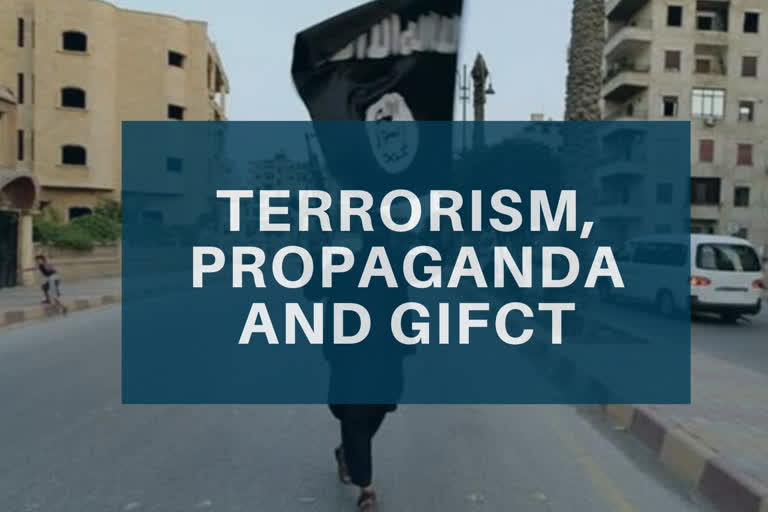Hyderabad:With the expansion of the Internet, the world's communication and technology industry is undergoing revolutionary changes. The modern technology is not only helping us but also helping the anti-social elements, thereby posing a great challenge to the country’s security and safety of the citizens.
Prior to the technical advancement in the country, it would take time for the rest of the world to know the messages that terrorists send to society. Any messages, once received by the organizations, are analyzed for their truth and only then, did the news agencies impart the message to the society.
However, these days, with the uninterrupted spread of social media, it is now just a matter of seconds within which the news/message is being revealed to the world at any moment. Terrorists are utilizing this feature to their advantage.
It has been a well-known fact for the entire world, on how the Islamic State in Iraq, Syria (ISIS) had used Social Media to expand its terror activities across the world. Zahran Hashim, the mastermind of the Sri Lankan Easter bomb attacks, had directed the youth to the terrorist activity, through social media itself.
Thus internet paved the way to spread ISIS operations worldwide, not just limiting to Iraq and Syria. 'ISIS' has adopted various strategies to attract its sympathizers in many countries across the globe, by using internet services from various under-developed countries.
It further selects completely developed countries that put internet to full use, through sharing and retweeting their messages. Because of such a strategy, though the global intelligence agencies are able to reach out the ones who have been doing the propaganda, they are never able to catch the actual culprits.
This propaganda influenced many youth to go to Syria to be part of the activities there, which led to innumerable deaths. Computers and Smartphones, once connected to internet services, can easily let us access any message on social media across the globe, without restriction.
Against this backdrop, even the tiniest message sent by terrorists poses a great threat to the security of the countries and international peace.
In March this year, 51 people were killed in an indiscriminate firing by a white man on the mosques of Christ Church City in New Zealand.
The attack was relayed in live, on the attacker’s social media account. This event is called the Christ Church Calling'. New Zealand’s Prime Minister Jacinda Ardern and France President Emmanuel Macron have already initiated steps to bring such heinous terrorist acts under control.
Initially, about 17 countries have come forward to sign an agreement to eliminate any such instigating content related to terrorism and extremist available on the Internet . Later, 31 countries have also agreed to do so.
Corporates like Facebook, Microsoft, Twitter, YouTube have come together to convene Global Internet Forum to Counter Terrorism (GIFCT). This platform blocks the extremist propaganda of terrorist organisations.
It takes precautionary measures against the transmission of anti-social information, pictures and videos. It is working with the United Nations Anti-Terrorism Organization. The GIFCT is calling for the prevention of terrorist propaganda on the Internet with four objectives.
Part of this is bringing big tech companies into the ‘fight against terrorism’; conducting online discussion forums for the civic society; make the general public be part of anti-terrorist awareness campaigns; Organizations like Amazon, LinkedIn, and WhatsApp are extending their support to GIFCT.
Particular attention is paid to '#' message forwards, which is the current trend being followed by today’s netizens. The GIFCT works to prevent the spread of terrorism on the Internet by sharing new innovations, information sharing and research. In the case of Christ Church-style events, terrorist organizations have begun a continuous study mechanism to transfer information without uploading it online.
Now, various software is available to reject the upload of objectionable videos and images. In particular, a database was created to prevent elements of pro-terrorism from being posted on social media. In India too, social media has been used by terrorists for their propaganda. Burhan Wani, a Kashmiri militant from the Hizbul Mujahideen anti-social militant group, has reportedly used social media completely, to attract the youth towards terrorism.
Jaish, Lashkar-e-Taiba too have carved out India's campaign in favor of the internet. There have been several instances where Indian intelligence agencies have stopped internet services in Kashmir to control these.
Many software manufactured by GIFCT are successful in detecting and preventing intrusive terrorist communications. These may not require the discontinuation of internet services in the coming days. Government intelligence agencies and civil society need to move forward in controlling terrorism.
In today's contemporary world, internet services like e-commerce, transport, e-mails, social networks and other internet services are the need of the hour!!
Terrorism should be completely eradicated without disruption to these services since our day to day lives are dependent on them. This is possible only when society also becomes a part of the huge fight against terrorism.
Read: Will death of ISIS Leader Baghdadi end terrorism?
